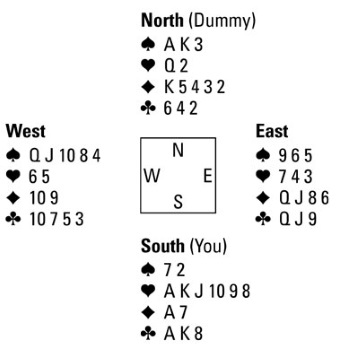
Slam bidding
Bidding a slam or grand slam in bridge
 Once again I must point out that you will probably not be involved with slam bidding until you have played for a while but when you finally do, these pages should be of some help.
Once again I must point out that you will probably not be involved with slam bidding until you have played for a while but when you finally do, these pages should be of some help.
You get a lot of extra points if you can bid and make a slam in bridge. There are, in fact, two slams. The first is when you bid six of a suit or six no trumps, which is an undertaking to take twelve tricks and a grand slam is where you take all thirteen tricks after bidding seven of something. You don't get hands like the one shown very often so you need to know how to deal with them.
With all slam bidding it is essential to know about first round controls of a suit in advance and in the case of a grand slam it's a good idea to know about second round controls too. Fortunately Acol has a way of finding out this information during the bidding.
Some bids leading up to a slam are known as conventional bids, are artificial and have a specific meaning. For that reason it is imperative that you and your partner have an understanding of what they mean and how to respond to them. You must also tell the opponents if they ask. There are basically three ways of finding out about controls in the suits. These are known as Gerber, Blackwood and Cue Bidding.
It should be emphasized that these artificial bids should only be used when the person initiating them has decided to try and bid a slam and knows what suit, (or no trumps), is to be used.
As mentioned above you need certain values and conditions before you even think about bidding a slam. The one obvious condition would be when the two hands contain enough high card points, generally speaking over thirty points. The other is that you MUST KNOW in which suit you will be playing or no trumps maybe.
Suppose my partner opens two spades showing a strong hand and I'm holding an opening hand with good spade support I could immediately think about a slam and make a bid which would ask for aces. At the end of the bidding I would decide at what level to stop based on what I know about partner's hand but s/he would play the hand as the person who mentioned the suit first becomes declarer.
Similarly if my partner opens two spades and I have a strong hand as above, don't like his spades but like the other three suits I would ask for aces again but at the end of the bidding I would place the contract in no trumps. This does have a disadvantage as the strong hand would become the dummy and become exposed to the opposition.
In practice there are many other ways of bidding a slam and people will generally use what they are most comfortable with. For more details check out this Wikipedia page.
Internal Website Links
- Home Page
- Weekly Results
- Bridge Etiquette
- Beginners Lessons
- Artificial Bids (Conventions)
- Slam Bidding
- English Bridge Union
- Play Bridge On Line
- Brian Bridge Scoring
Ads by Google
